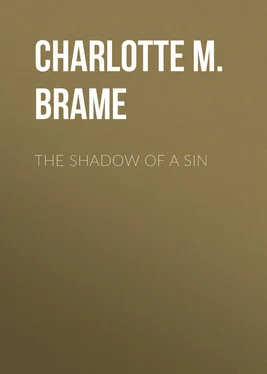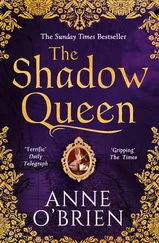Charlotte Brame - The Shadow of a Sin
Здесь есть возможность читать онлайн «Charlotte Brame - The Shadow of a Sin» — ознакомительный отрывок электронной книги совершенно бесплатно, а после прочтения отрывка купить полную версию. В некоторых случаях можно слушать аудио, скачать через торрент в формате fb2 и присутствует краткое содержание. ISBN: , Жанр: foreign_antique, foreign_prose, на английском языке. Описание произведения, (предисловие) а так же отзывы посетителей доступны на портале библиотеки ЛибКат.
- Название:The Shadow of a Sin
- Автор:
- Жанр:
- Год:неизвестен
- ISBN:http://www.gutenberg.org/ebooks/42320
- Рейтинг книги:4 / 5. Голосов: 1
-
Избранное:Добавить в избранное
- Отзывы:
-
Ваша оценка:
- 80
- 1
- 2
- 3
- 4
- 5
The Shadow of a Sin: краткое содержание, описание и аннотация
Предлагаем к чтению аннотацию, описание, краткое содержание или предисловие (зависит от того, что написал сам автор книги «The Shadow of a Sin»). Если вы не нашли необходимую информацию о книге — напишите в комментариях, мы постараемся отыскать её.
The Shadow of a Sin — читать онлайн ознакомительный отрывок
Ниже представлен текст книги, разбитый по страницам. Система сохранения места последней прочитанной страницы, позволяет с удобством читать онлайн бесплатно книгу «The Shadow of a Sin», без необходимости каждый раз заново искать на чём Вы остановились. Поставьте закладку, и сможете в любой момент перейти на страницу, на которой закончили чтение.
Интервал:
Закладка:
"And you will see, my darling, that all is for the best."
He would not allow her time to think or to grow dull. He talked to her till the color returned to her face and the brightness to her eyes. They looked together from the carriage windows, watching the shining stars and the darkened earth, wondering at the beautiful, holy silence of night, until the faint gray dawn broke in the skies. Then a mishap occurred.
The train had proceeded on its way safely enough until a station called Leybridge had been reached. There the passengers for London leave it, and await the arrival of the mail train. Hyacinth and Claude left the carriage; the train they had travelled by went on.
"We have not long to wait for the mail train," said Claude, "and then, thank goodness, there will be no more changing until we reach London."
The faint gray dawn of the morning was just breaking into rose and gold. Hyacinth looked pale and cold; the excitement, the fatigue, and the night travelling were rapidly becoming too much for her.
They walked up and down the platform for a few minutes. A quarter of an hour passed – half an hour – and then Claude, still true to his determination that Hyacinth should not be seen, bade her to sit down again while he went to inquire at the office the cause of delay. There were several other passengers, for Leybridge Junction was no inconsiderable one.
Suddenly there seemed to arise a scene of confusion in the station. The station master came out with a disturbed face; the porters were no longer sleepy, but anxious. Then the rumor, whispered first with bated breath, grew – "An accident to the mail train below Lewes. Thirty passengers seriously injured and half as many killed. Traffic on the line impossible."
Claude heard the sad news with a sorrowful heart. He did not wish Hyacinth to know it – it would seem like an omen of misfortune to her. "When will the next train start for London?" he asked one of the porters.
"There is none between now and seven o'clock," the man replied.
"Was there ever anything so unfortunate?" muttered Claude to himself.
Leybridge was only twenty miles from Oakton.
"I should not like any one to see me about the station," he thought; "and Hyacinth is sure to be known here. How unfortunate that we should be detained so near home!" He went out to her: "You must not lose patience, Hyacinth," he said; "the mail train is delayed, and we have to wait here until seven."
She looked up at him, alarmed and perplexed. "Seven," she repeated – "and now it is only three. What shall we do, Claude?"
"If you are willing, we will go for a walk through the fields. I fancy we shall be recognized if we stop here."
"I am sure we shall – I have often been to Leybridge with Lady Vaughan."
They went out of the station and down the quiet street; they saw an opening that led to the fields.
"You will like the fields better than anywhere else," said Claude, and she assented.
They crossed a stile that led into the fertile clover meadows. It seemed as though the beauty and fragrance of the summer morning broke into full glow to welcome them; the rosy clouds parted, and the sun shone in the full lustre of its golden light; the trees, the hedges, the clover, were all impearled with dew – the drops lay thick, shining and bright, on the grass; there was a faint twitter of birds, as though they were just awakening; the trees seemed to stir with new life and vigor.
"Is this the morning?" said Hyacinth, looking round. "Why, Claude, it is a thousand times more beautiful than the fulness of day!"
CHAPTER VII
Hyacinth and Claude stood together leaning against the stile. Something in the calm beauty of the summer morning awoke the brightest and purest emotions in him; something in the early song of the birds and in the shining dewdrops made Hyacinth think more seriously than she had yet done.
"I wonder," she said, turning suddenly to her lover, "if we shall ever look back to this hour and repent what we have done?"
"I do not think so. It will rather afford subject for pleasant reflection."
"Claude," she cried suddenly, "what is that lying over there by the hedge? It – it looks so strange."
He glanced carelessly in the direction indicated. "I can see nothing," he replied. "My eyes are not so bright as yours."
"Look again, Claude. It is something living, moving – something human I am sure! What can it be?"
He did look again, shading his eyes from the sun. "There is something," he said slowly, "but I cannot tell what it is."
"Let us see, Claude; it may be some one ill. Who could it be in the fields at this time of the morning?"
"I would rather you did not go," said Claude; "you do not know who it may be. Let me go alone."
But she would not agree to it; and as they stood there, they heard a faint moan.
"Claude," cried the girl, in deep distress, "some one is ill or hurt; let us go and render assistance."
He saw that she was bent upon it and held out his hand to help her over the stile. Then when they were in the meadow, and under the hedge, screened from sight by rich, trailing woodbines, they saw the figure of a woman.
"It is a woman, Claude!" cried Hyacinth; and then a faint moan fell on their ears.
Hastening to the spot, she pushed aside the trailing eglantines. There lay a girl, apparently not much older than herself, fair of face, with a profusion of beautiful fair hair lying tangled on the ground. Hyacinth bent over her.
"Are you ill?" she asked. But no answer came from the white lips. "Claude," cried Hyacinth, "she is dying! Make haste; get some help for her!"
"Let us see what is the matter first," he said.
The sound of voices roused the prostrate girl. She sat up, looking wildly around her, and flinging her hair from her face; then she turned to the young girl, who was looking at her with such gentle, wistful compassion.
"Are you ill?" repeated Hyacinth. "Can we do any thing to help you?"
The girl seemed to gather herself together with a convulsive shudder, as though mortal cold had seized her.
"No, I thank you," she said. "I am not ill. I am only dying by inches – dying of misery and bad treatment."
It was such a weary young face that was raised to them. It looked so ghastly, so wretched, in the morning sunlight, that Hyacinth and Claude were both inexpressibly touched. Though she was poorly clad, and her thin, shabby clothes were wet with dew, and stained by the damp grass, still there was something about the girl that spoke of gentle culture.
Claude bent down, looking kindly on the dreary young face.
"There is a remedy for every evil and every wrong," he said; "perhaps we could find one for you."
"There is no remedy and no help for me," she replied; "my troubles will end only when I die."
"Have you been sleeping under this hedge all night?" asked Hyacinth.
"Yes. I have no home, no money, no food. Something seemed to draw me here. I had a notion that I should die here."
Hyacinth's face grew pale; there was something unutterably sad in the contrast between the bright morning and the crouching figure underneath the hedge.
"Are you married?" asked Claude, after a short pause.
"Yes, worse luck for me!" she replied, raising her eyes, with their expression of guilt and misery, to his, "I am married."
"Is your husband ill, or away from you? or what is wrong?" he pursued.
"It is only the same tale thousands have to tell," she replied. "My husband is not ill; he simply drinks all day and all night – drinks every shilling he earns – and when he has drunk himself mad he beats me."
"What a fate!" said Claude. "But there is a remedy – the law interferes to protect wives from such brutality."
"The law cannot do much; it cannot change a man's heart or his nature; it can only imprison him. And then, when he comes out, he is worse than before. Wise women leave the law alone."
Читать дальшеИнтервал:
Закладка:
Похожие книги на «The Shadow of a Sin»
Представляем Вашему вниманию похожие книги на «The Shadow of a Sin» списком для выбора. Мы отобрали схожую по названию и смыслу литературу в надежде предоставить читателям больше вариантов отыскать новые, интересные, ещё непрочитанные произведения.
Обсуждение, отзывы о книге «The Shadow of a Sin» и просто собственные мнения читателей. Оставьте ваши комментарии, напишите, что Вы думаете о произведении, его смысле или главных героях. Укажите что конкретно понравилось, а что нет, и почему Вы так считаете.












